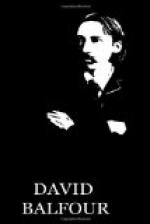“I am pleased to make your acquaintance, Mr. Balfour,” he said, when he had done. “Let me offer you a glass of claret.”
“Under your favour, my lord, I think it would scarce be fair on me,” said I. “I have come here, as the letter will have mentioned, on a business of some gravity to myself; and as I am little used with wine, I might be the sooner affected.”
“You shall be the judge,” said he. “But if you will permit, I believe I will even have the bottle in myself.”
He touched a bell, and the footman came, as at a signal, bringing wine and glasses.
“You are sure you will not join me?” asked the Advocate. “Well, here is to our better acquaintance! In what way can I serve you?”
“I should perhaps begin by telling you, my lord, that I am here at your own pressing invitation,” said I.
“You have the advantage of me somewhere,” said he, “for I profess I think I never heard of you before this evening.”
“Right, my lord; the name is indeed new to you,” said I. “And yet you have been for some time extremely wishful to make my acquaintance, and have declared the same in public.”
“I wish you would afford me a clue,” says he. “I am no Daniel.”
“It will perhaps serve for such,” said I, “that if I was in a jesting humour—which is far from the case—I believe I might lay a claim on your lordship for two hundred pounds.”
“In what sense?” he inquired.
“In the sense of rewards offered for my person,” said I.
He thrust away his glass once and for all, and sat straight up in the chair where he had been previously lolling. “What am I to understand?” said he.
“A tall strong lad of about eighteen,” I quoted, “speaks like a Lowlander, and has no beard.”
“I recognise those words,” said he, “which, if you have come here with any ill-judged intention of amusing yourself, are like to prove extremely prejudicial to your safety.”
“My purpose in this,” I replied, “is just entirely as serious as life and death, and you have understood me perfectly. I am the boy who was speaking with Glenure when he was shot.”
“I can only suppose (seeing you here) that you claim to be innocent,” said he.
“The inference is clear,” I said. “I am a very loyal subject to King George, but if I had anything to reproach myself with, I would have had more discretion than to walk into your den.”
“I am glad of that,” said he. “This horrid crime, Mr. Balfour, is of a dye which cannot permit any clemency. Blood has been barbarously shed. It has been shed in direct opposition to his Majesty and our whole frame of laws, by those who are their known and public oppugnants. I take a very high sense of this. I will not deny that I consider the crime as directly personal to his Majesty.”
“And unfortunately, my lord,” I added a little drily, “directly personal to another great personage who may be nameless.”




